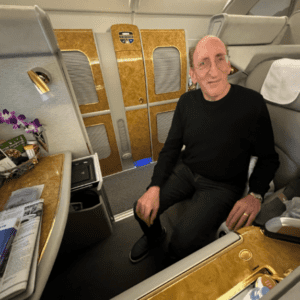 In order to get into direct contact with their guests early in the booking process, hoteliers have to overcome the practice of commoditisation. The best way to take the focus off the price discussion is automatic pricing.
In order to get into direct contact with their guests early in the booking process, hoteliers have to overcome the practice of commoditisation. The best way to take the focus off the price discussion is automatic pricing.
According to a study by Accenture, 75 percent of consumers today place increasing value on personalised experiences and offers. At the same time, only a third are satisfied with the loyalty program of their current provider. So there is a clear gap between what people want and what Êindustry offers them today.
This is the reality which is currently facing the hotel industry. Some in the sector believe the idea of experiential economics is over-rated. I think the hotel industry is at the very start of its journey and is just beginning to learn how to use technology to provide the best service for its guests.
How do we know that the guest wants personalised offers?
A really good example of this is the way Disney has embraced the concept of personalisation Ð an impressive 90% of its guests using the “Magic Band” (RFID-equipped plastic wristband used at Walt Disney World Resort) say they’re satisfied or very satisfied with its functionality.
Here’s an example of how the Magic Band can deliver a personalised experience. You enter a Disney restaurant Ð the restaurant manager, waiting staff and chefs know you’ve taken a seat and deliver your pre-ordered food to your table without fuss.
As Disney owns most of its real estate and outlets it can collect, manage and analyse all data in one place Ð there are probably 50 such touchpoints with its customers during a typical stay in their hotels and parks. Currently they’re not optimising all 50 Ð and the fact that it’s taken them many years to do so emphasises how the hospitality industry is at the beginning of this journey.
How does a hotel company make the step into the future?
The commoditisation of hotel products is currently at its peak. If guests book via travel portals, the juxtaposition of identical offers no longer shows the subtle or significant differences between hotels. Apart from the price, the offers are barely distinguishable. Consumers are thereby fixed on the price.
For hoteliers, this opens new opportunities Ð when you put the wishes of the guest in the centre of the process, you immediately start direct conversations with them.
For example, does the guest want a balcony, a view, a breakfast? These are all wishes and preferences that are often prioritised ahead of the price. To personalise their experience, the customer is more likely to want to buy individual attributes than a specific room type. Giving the guest the ability to choose what they want means the hotel must have an individual price for every combination.
This new approach, which I call customer choice pricing, enables dynamic pricing for any component based on the customer’s needs. This not only helps hoteliers monetise the guest experience, but also increases the choice and level of personalisation for the ever-increasingly happy guest.
Currently, no hotels in the industry have anything like the Magic Band on offer Ð but we all have our phones in our pockets, which will be the future Magic Bands. We need to think about what we can do to track customer behaviour, the locations where customer flows are captured, and how the information is converted into seamless intelligence.
What role does Big Data and Revenue Management play in this?
I prefer to use the term “Right Data” to big data. When I start incorporating more data points into my revenue management, I have to ask myself Ð will this extra data point actually help me make better decisions? The cost of collecting this information must also be entered into the equation. Sometimes the cost of acquiring this additional dataset outweighs the benefit you derive from it.
So it’s important to examine this from the point of view of accessing the right data rather than just the amount of data.
Which is the right data?
Among the data points hoteliers should look at to optimise their revenue are competitor room rates and online reputation scores. That alone already requires a lot of intelligence in the algorithm.
Take for example how you influence demand before the guest chooses a hotel. Concentrate on working with historical data and the ancillary revenue of a hotel. What you really want as a hotel is building loyalty, a more personalised experience, a marketing ROI, and of course, the optimal business in the current market performance.
The biggest obstacles to introducing automatic pricing
Many have an inherent distrust of artificial intelligence making key decisions. So when we talk about artificial intelligence, cognitive intelligence, adaptive intelligence and intelligent chatbots, should we think for a minute about whether we are actually ready to let the intelligence take over?
The answer is yes. Time and again we’ve proven that if you let the system do what it is supposed to do, if you let the intelligence be intelligent, you get the better result. I’ve seen examples whereby a hotel recently achieved a 40 percent increase in sales when the revenue management system was allowed to do what it was installed for.
How exactly does the implementation of a revenue management system work?
The road to optimal revenue starts with a review of historical data. Then, when you next move onto looking at performance data, things start to become much more diagnostic, and when you finally move in the direction of price forecasts, the process becomes predictive.
It’s at this point you add the market intelligence: who books and who researches only, who stays and who dreams. This penetrates into prescriptive areas. To do this, add a fully automated revenue management solution with machine learning Ð it’s an adaptive solution that constantly adjusts the results and decisions made based on the inputs it receives.
One final thing to remember. If you think you’re smarter than a system that has 30 years of experience built in to its program, the chances are that you’re wrong.
About the author
 Klaus Kohlmayr is the Chief Evangelist for IDeaS Revenue Solutions. He returned to IDeaS Revenue Solutions in 2017 after four years away to be part ofÊthe change that’s coming to the industry over the next few years, so he could drive it and talk about it.
Klaus Kohlmayr is the Chief Evangelist for IDeaS Revenue Solutions. He returned to IDeaS Revenue Solutions in 2017 after four years away to be part ofÊthe change that’s coming to the industry over the next few years, so he could drive it and talk about it.



















